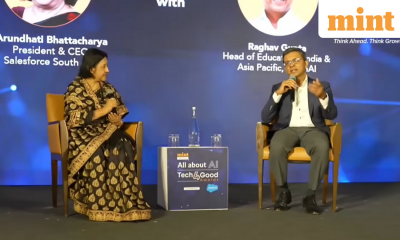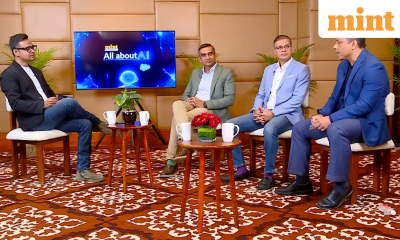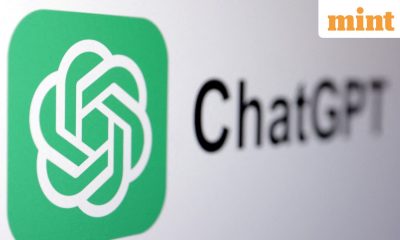

Metaverse
Google’s AI edge set to catch rivals – Crypto News
New Delhi: Google on Wednesday announced its new foundational artificial intelligence (AI) model, Gemini, replacing its Pathways Language Model (PaLM) that so far powered all of its generative AI applications and offerings.
The new offering will come in three sizes—Nano, Pro and Ultra—and debuted through Google’s AI chatbot, Bard, in English across 170 countries including India.
However, while claiming that the new AI model “exceeds state-of-the-art” AI models, Google executives did not reveal the size of the model in terms of the number of data parameters, or how it compares with OpenAI’s Generative Pre-trained Transformer (GPT)-4 model that underpins the latest versions of ChatGPT, at a media roundtable ahead of the announcement.
Eli Collins, vice-president of product at Google DeepMind, said Gemini is “more efficient” than previous AI models developed by Google.
However, while Google said Gemini outperforms OpenAI’s GPT-3.5 during the roundtable, they did not offer a reference as to whether the model would outperform GPT-4 as well.
Gemini Nano will be the smallest, lightest version of the AI model, and will be used in localized applications.
A version of Gemini Nano was piloted Wednesday through Google’s newest smartphone, Pixel 8 Pro, and is also available in India. Bard, will be powered by Gemini Pro, but will support only English. Support for other languages will be expanded subsequently.
Other products such as Search, Ads and Chrome will continue to use PaLM for the time being, and be switched to Gemini eventually. Google also said a new version of its Bard chatbot—Bard ‘Advan-ced’—will also be launched “early next year”, and use the Gemini Ultra model.
In a blog post, Demis Hassabis, CEO Deepmind, Google’s AI research division, said the company is already experimenting with Gemini underneath the Google Search Generative Experience (SGE), for which the company introduced Indic language support in August. Hassabis said Gemini has reduced latency of search results by “40%” as compared with PaLM-powered SGE outputs.
In the press briefing, Collins said the Gemini model was built to be natively multi-modal—thereby “understanding” text, images and audio as input and output methods by default. The new AI model is also trained to natively address hallucinations and issues of bias—factors that have plagued generative AI applications ever since OpenAI’s ChatGPT brought the generative AI subset into the limelight.
Calling it “our most capable and general model yet,” Sundar Pichai, chief executive of Google and its parent firm Alphabet, added, “These are the first models of the Gemini era and the first realization of the vision we had when we formed Google DeepMind earlier this year. This new era of models represents one of the biggest science and engineering efforts we’ve undertaken as a company.”
Google claimed that Gemini’s overall performance “exceeds current state-of-the-art results on 30 of the 32 widely-used academic benchmarks used in LLM R&D.”
Industry-wide standards, however, continue to hold OpenAI’s Generative Pre-trained Transformer (GPT)-4 model as the industry-leading standard. The latter, which powers enterprise offerings of GPT-4 as well as ChatGPT, is largely seen as the most popular industry standard AI model in the market until date. Meta, too, unveiled its latest generation AI model, Llama-2, in July this year. Microsoft is a significant investor in OpenAI, and has also partnered Meta for Llama-2, thereby making it a key strategic rival to Google in the generative AI race.
The launch of Gemini comes as industry stakeholders expect generative AI to mature in business use cases in the coming year. Last week, John Roese, global chief technology officer at Dell, said that more businesses will use more mature generative AI applications, while the general hype and pilots around the technology could die down.
Google on Wednesday also announced v5p—its latest-generation Tensor Processing Unit (TPU). The latter is a custom chip designed in-house by Google, specializing in AI use cases. The company called it the “most powerful, efficient and scalable TPU system to date.”
-

 Technology7 days ago
Technology7 days agoMulticloud Agility Comes to Financial Services – Crypto News
-

 Cryptocurrency1 week ago
Cryptocurrency1 week agoOpenAI Confirms Data Breach—Here’s Who Is Impacted – Crypto News
-

 Cryptocurrency1 week ago
Cryptocurrency1 week agoNew chains, old problems – Blockworks – Crypto News
-

 Blockchain1 week ago
Blockchain1 week agoEther Eyeing $3.2K As Stablecoin Yields Remain Low: Santiment – Crypto News
-
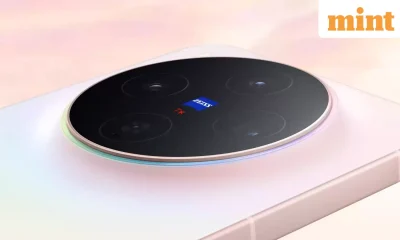
 Technology7 days ago
Technology7 days agoVivo X300, X300 Pro launched in India, price starts at ₹75,999: Display, camera details and all you need to know – Crypto News
-

 Blockchain1 week ago
Blockchain1 week agoWhat’s Going On Behind The Scenes With XRP? Expert Answers – Crypto News
-
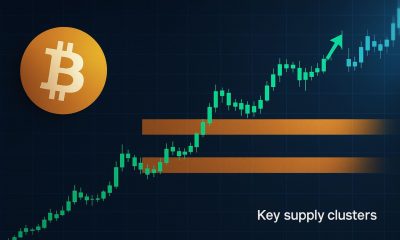
 Blockchain1 week ago
Blockchain1 week agoBitcoin Must Break Key Supply Clusters To Regain ATH Momentum – Watch These Levels – Crypto News
-

 Blockchain1 week ago
Blockchain1 week agoUpbit $30 Million Hack Update: Authorities Link Breach To North Korean Hackers – Crypto News
-
others1 week ago
Why Crypto Market Down Today? (29 Nov) – Crypto News
-
others1 week ago
Solana Price Outlook as CoinShares Withdraws SEC Filing for Staked Solana ETF – Crypto News
-

 Cryptocurrency1 week ago
Cryptocurrency1 week agoCrypto market mixed as Bitcoin tests $93K, Ethereum and XRP hit major resistance – Crypto News
-

 Blockchain1 week ago
Blockchain1 week agoEther Eyeing $3.2K As Stablecoin Yields Remain Low: Santiment – Crypto News
-
Business1 week ago
Crypto Exchange Bitget Donates $1.54M To Hong Kong Fire Victims – Crypto News
-

 Cryptocurrency1 week ago
Cryptocurrency1 week agoZcash, Monero in Tight Ranking Race: Who Wins? – Crypto News
-
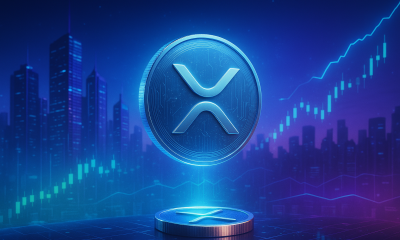
 Cryptocurrency1 week ago
Cryptocurrency1 week agoXRP price prediction: ETF inflows, CME futures, and technical pressure align – Crypto News
-

 Cryptocurrency1 week ago
Cryptocurrency1 week agoWhy CoinShares Just Quit the $600M XRP and SOL ETF Battle – Crypto News
-

 others1 week ago
others1 week agoWTI Crude Oil gains as Russia-Ukraine talks, OPEC+ meeting eyed – Crypto News
-

 others1 week ago
others1 week agoGBP/USD edges lower to 1.3220 – Crypto News
-

 Metaverse1 week ago
Metaverse1 week agoIs Big Tech’s superintelligence narrative inflating the AI bubble? – Crypto News
-
Technology1 week ago
Jerome Powell Speech Today: What To Expect as Fed Ends QT – Crypto News
-
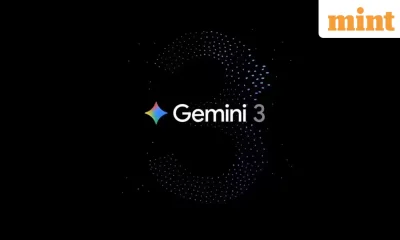
 Technology1 week ago
Technology1 week agoYou’re using Gemini wrong: 7 Viral AI prompts that will instantly transform your presentations – Crypto News
-
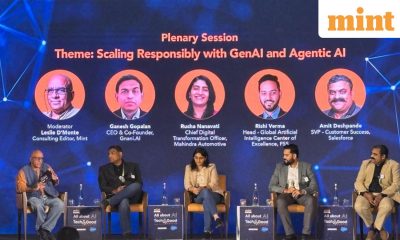
 Metaverse1 week ago
Metaverse1 week agoAI’s positive impact in focus at Mint All About AI Tech4Good Summit 2025 – Crypto News
-

 Cryptocurrency1 week ago
Cryptocurrency1 week ago‘ZEC Is 20x Lower Than XRP’: Solana Builder Breaks Silence After Zcash’s 50% Crash – Crypto News
-
Business1 week ago
Coinbase Submits Recommendations to CFTC on Crypto Market Rules – Crypto News
-

 Blockchain1 week ago
Blockchain1 week agoBitcoin Forms Short-Term Bottom, $100,000 Rally in Sight – Crypto News
-

 Cryptocurrency1 week ago
Cryptocurrency1 week agoRemittix vs. Digitap ($TAP): Get in the action for $1 million in Black Friday bonuses – Crypto News
-
Business1 week ago
Michael Saylor Hints Fresh Bitcoin Buy With “Green Dots” Tease – Crypto News
-

 Cryptocurrency1 week ago
Cryptocurrency1 week agoBitcoin, Ethereum, and XRP Crash Triggering $637M in Liquidations – Crypto News
-
others7 days ago
Ethereum Price Crashes Below $3,000 as $500M Longs Liquidated: What’s Next? – Crypto News
-

 others1 week ago
others1 week agoXAG/USD hits record $56 as bulls dominate – Crypto News
-
Business1 week ago
China Begins Policy Talks to Crack Down on Stablecoin and Crypto Payments – Crypto News
-

 Blockchain1 week ago
Blockchain1 week agoSUI Climbs Into High-Risk Territory As Wave 4 Nears Its Exhaustion Point – Crypto News
-
Business1 week ago
Robert Kiyosaki Recommends Bitcoin and Ethereum as Hedge Against Potential Global Crisis – Crypto News
-
Business1 week ago
Hyperliquid Team Moves $90M HYPE as Network Becomes Top Fee Chain – Crypto News
-

 Technology1 week ago
Technology1 week agoIs your iPhone obsolete? Apple adds 5 new devices to the ‘no repair’ list – Crypto News
-

 Cryptocurrency1 week ago
Cryptocurrency1 week agoTurkmenistan joins global crypto regulation push with sweeping new digital asset law – Crypto News
-
others1 week ago
21Shares XRP ETF To Begin Trading on Monday as Institutional Inflows Hit $666 Million – Crypto News
-
Business1 week ago
Arthur Hayes Predicts Bitcoin Rally To $500K By Next Year Over Fed Easing – Crypto News
-
Cryptocurrency1 week ago
Peter Schiff Predicts Bitcoin Decline Will Extend Into December as BTC Closes Out Red November – Crypto News
-
Technology1 week ago
Ethereum Price Prediction 2025: How High Can ETH Go by Year-End? – Crypto News
-
others1 week ago
BNB Chain Taps Arbitrum Veteran Nina Rong to Lead Ecosystem Growth – Crypto News
-
others1 week ago
Is Kalshi Manipulating Prediction Markets? Platform Hit With Lawsuit Over Violations – Crypto News
-

 others1 week ago
others1 week agoGBP/JPY steadies as firm Tokyo inflation revives BoJ rate-hike speculation – Crypto News
-

 others1 week ago
others1 week agoCanada GDP smashes expectations at 2.6% – TDS – Crypto News
-
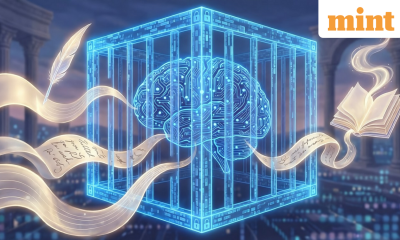
 Technology1 week ago
Technology1 week agoChatGPT and Gemini can be tricked into giving harmful answers through poetry, new study finds – Crypto News
-
others1 week ago
Grayscale Cleared to Launch First Spot Chainlink ETF This Week Amid Rising Demand – Crypto News
-
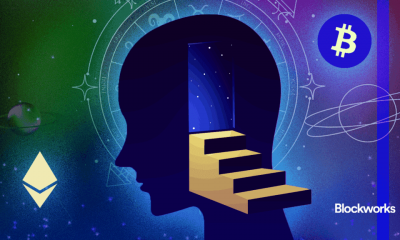
 Cryptocurrency1 week ago
Cryptocurrency1 week agoAstrology for traders – Blockworks – Crypto News
-
Technology1 week ago
Sony Bank Joins Ripple, Circle to Launch USD-Pegged Stablecoin in the U.S. by 2026 – Crypto News
-
Business1 week ago
Schiff Predicts ‘Beginning of the End’ for MSTR as Strategy Eases Bitcoin Sell-Off Fears With $1.44B Reserve – Crypto News
-
Cryptocurrency1 week ago
Operation Choke Point: House Republicans Spotlight Biden Administration’s ‘Attack on Crypto’ – Crypto News











